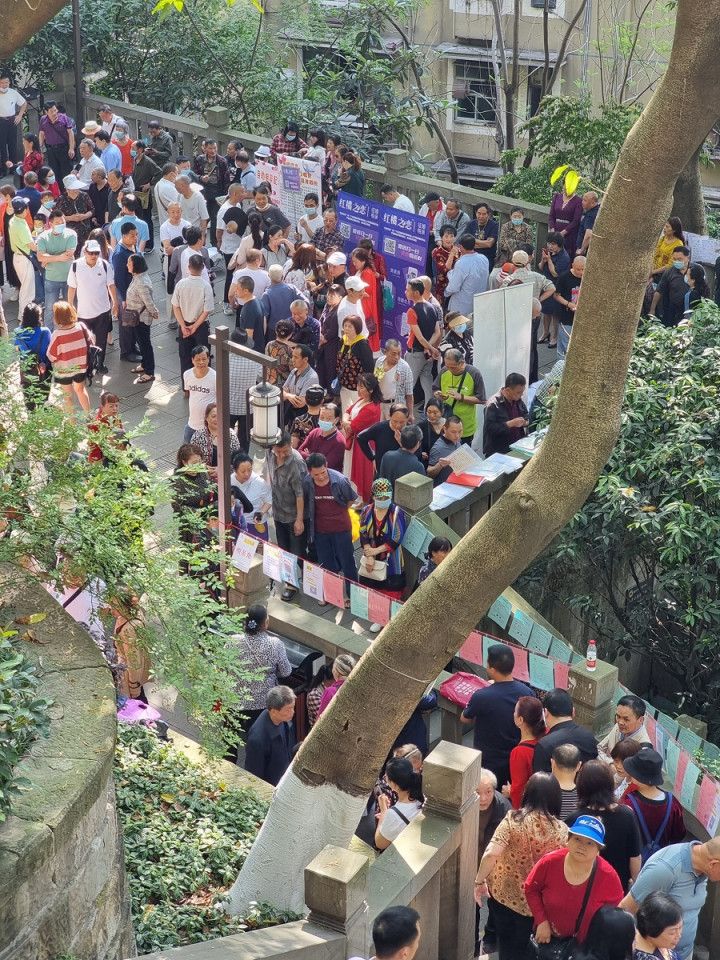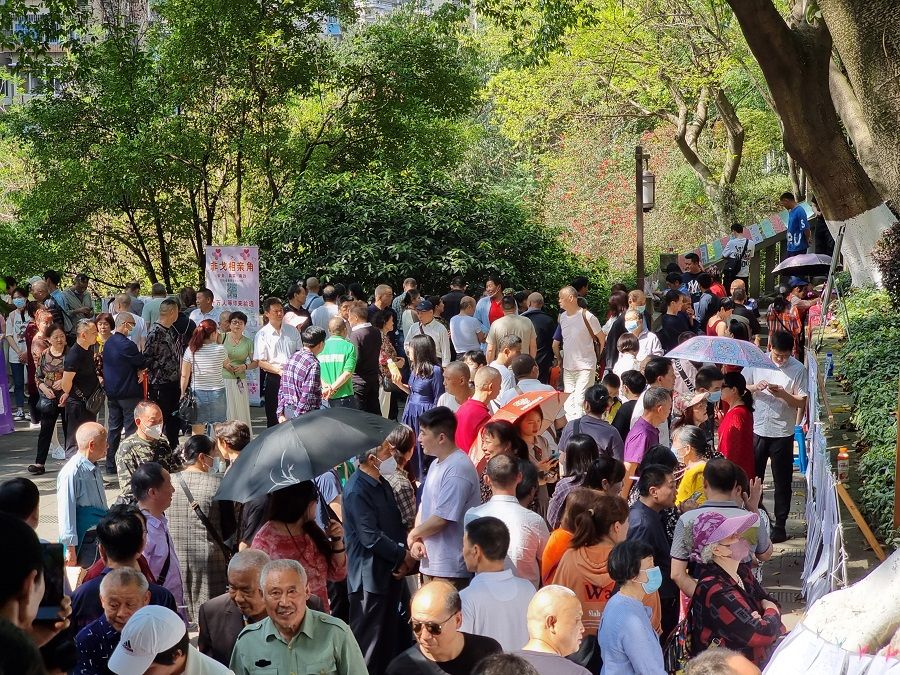Desperate parents gather in China's latest matchmaking park for the sake of their kids

"The success rate is very low, maybe not even 10%. But this is the only way to help my son and our only chance, so I must try my best."
On weekdays, the Chongqing People's Park is a scene of serenity, but since the start of this year, it has been teeming with people every weekend.
Matchmaking in the park returning with a bang
Located near Chongqing's busy shopping street Jiefangbei Pedestrian Street, the Chongqing People's Park is built on a hill and has a modest area of only 1.2 hectares. It is the first park in Chongqing and is more than a hundred years old. Though it has few sights, it is a major thoroughfare between the upper and lower halves of the city, with a criss-cross of meandering pathways and stone steps.
The area is also home to Chongqing's matchmaking corner, described by the Chinese media as China's "latest love corner in a park".
Ironically, there are often few young people in the crowd.
I learnt that the Chongqing matchmaking corner was initially located at the tourist attraction Hongyadong for more than a decade. But access to the area in the past three years was restricted due to the pandemic, so the matchmaking corner was relocated to the People's Park in the second half of 2022.

During the weekends, hordes of parents would descend on the park early in the morning, taking their time to browse the personal information of singles on display at various corners of the hill so that they do not miss out on any potential mates for their children. Ironically, there are often few young people in the crowd.
The matchmakers operating there said that since the easing of Covid-19 restrictions, there has been a surge in demand and many Chongqing parents have been turning up on weekends to find a partner for their children.
Liu Jun, a 60-year-old matchmaker in Chongqing, told Zaobao that the demand from Chongqing parents is huge. "Many parents play active roles in helping their children find lifelong partners because they empathise with the workload and stress of the younger generation," she said.
"They not only look at the man's education and job, but also want him to have a car and a house, to have the right ideals and values, to be tall and handsome..." - Shen Zaicheng, a parent at the matchmaking corner
Parents advertising their children
During my visit to the matchmaking corner, 50-year-old Shen Zaicheng was there on a sweltering day braving the heat to find a suitable partner for his son but was left with disappointment after browsing the sea of personal information. In fact, the Chongqing native has frequented the corner for more than a month.
Shen and his family have lived in Chongqing's Jiefangbei area for 20 years. He said that even though there are plenty of suitable partners for his son at the matchmaking corner, the ladies and their families are too demanding. He lamented, "They not only look at the man's education and job, but also want him to have a car and a house, to have the right ideals and values, to be tall and handsome..."

Most of the singles' "advertisements" on display at the matchmaking corner were paid for by the parents, with the height, weight, occupation, income, educational attainment and other requirements of potential partners clearly listed. The personal details of the seekers in all these aspects and the contact details of their parents were also provided.
Many of the parents lamented that the matchmaking corner is like a "hypermarket" and they have to try to "outmanoeuvre" the other parents. It is also a microcosm of the socioeconomic divide.
As his family is not well-to-do, Shen said that he did not dare approach the women's families, "We don't meet their criteria, so it's pointless to even ask."
Shen said that parents at the matchmaking corner are the gatekeeper for their children's choice of spouse. They would go on the phone or WeChat for as long as half a month to find out everything they could about the other party, "uncovering 95% of their background", thoroughly checking the veracity of the advertised information, such as the other party's property holdings, educational background and job. Arrangements for the meeting between the young people can only happen after satisfactory verification.
As his family is not well-to-do, Shen said that he did not dare approach the women's families, "We don't meet their criteria, so it's pointless to even ask."
More men than women
The findings from China's Seventh National Population Census released in May 2021 showed that there were 17.52 million more men than women in the 20 to 40-year-old age group. This indicated a continued imbalance among those of marriageable age in the country and that women hold the advantage when it comes to selecting a partner.
In most Chongqing families, the woman traditionally holds the purse strings and has the final say, making the man the weaker gender.

Shen said that because there are so many more men than women of marriageable age, it is more common for the men's families to bootlick the women's families, and for the former to be disregarded or ignored.
Highlighting the inequality in dating criteria, Shen said, "If the girl has a bachelor's degree, she would want a guy with a higher qualification. If she is earning a salary of 10,000 RMB (US$1,400), she would want a guy who is earning more than that."
He also observed that men who have stable jobs, high incomes, and own a house and a car remain popular at the matchmaking corner. He said, "Even if a guy is handsome and 1.8 metres tall, if he does not have a stable job, make a certain amount of money, and have a house, girls will not even give him the time of day because he does not make them feel secure."
Shen lamented that at the matchmaking corner, "the chances of a successful match are very low, not even 10%... 99.99% of the people there only look at money, they are very pragmatic."
... these days, Chongqing women are more fussy than men in choosing a partner. - Chen Zihan, Chongqing matchmaker
Hard to find a match
Chen Zihan, a 32-year-old Chongqing matchmaker operating at the matchmaking corner, concurred that the chances of a successful match at the corner are "not very high". She pointed out that nowadays, young people are generally not keen on marriage and quite a number of them only show up for the matchmaking sessions out of filial piety.
According to Chen, young people in Chongqing who are of marriageable age fall into three categories: first, those who can support themselves and crave freedom; second, those who are unable to support themselves, much less a family; and third, those who feel that they come from well-to-do families and set unrealistic requirements for potential partners, sending their parents into a panic.
Chen observed that while those in the second group are keener on settling down and starting families, the reality is that they often lack the material means and are unable to do so.
She pointed out that these days, Chongqing women are more fussy than men in choosing a partner. They want men who "obey them", so it is "harder to find a match for the women because they are more demanding".

Even though the chances of success are not high, Shen is still counting on this "only chance" to find a wife for his son because he, his wife and his son do not have big social circles. He said, "Without someone to make introductions for you and if you are also not adept [at making friends], matchmaking is the only avenue left."
Economic impact of pandemic on young people
On the day that I visited, Yu Ping, a Chongqing mother in her fifties, was at the matchmaking corner on behalf of her son.
Yu, who is still working, said that her son is nearly 1.8 metres tall and rather handsome, but her family is not well-off. They live in a rental and do not own a property or a car, so even if her son wanted to marry and start a family, they cannot afford it.

Yu felt that the three years of the pandemic have made life much harder. She said that before the pandemic, many companies would reward employees with cash and gifts on festive holidays to help them cope with living expenses, but these benefits were taken away during the pandemic and have not been reinstated even though Covid-19 restrictions have been lifted. The economic impact on young people is significant.
The matchmakers, parents and young people at the matchmaking corner revealed that the wages earned by young people in Chongqing are generally on the low side, ranging from 4,000 RMB to 6,000 RMB per month. Few among them earn more than 10,000 RMB a month.
Many of the young people working in the Chongqing city centre rent their accommodations. With the cheapest rental in the market costing around 1,000 RMB each month, they need to be careful about how to spread what is left of their monthly incomes towards daily necessities, food, groceries, utilities and transport.
Gu Jia is a Chongqing native in her thirties facing a considerable amount of familial pressure to get married. She was one of the few young people at the matchmaking corner.
She said that there are many factors preventing young people from starting families. She lamented, "Everything is getting more expensive but our wages are stagnant, so it is impossible to support a family. I can barely support myself."
Bleak economic outlook lead to marriage delays
In recent years, the employment outlook for young people in China has remained bleak. The latest government data indicate that the unemployment rate among those aged between 16 and 24 years old reached a new high of 20.4% in April this year, nearly four times that of the national average across all age groups. It is also 2.3 and 0.8 percentage points higher than in February and March respectively. With more than 11 million college students getting ready to enter the workforce, the unemployment rate of young people is expected to continue rising.
"It is not that young people do not want to marry, it is because we cannot afford to." - Gu Jia, a young woman in Chongqing

Gu pointed out that the poor outlook for the labour market means that young people do not hold much hope of their wages rising. She said, "Your company will not persuade you to stay if you want to leave due to the low wages, because there are plenty of others queuing up to replace you... It is not that young people do not want to marry, it is because we cannot afford to."
Tan Gangqiang, head of a psychology consultation centre in Chongqing, told Zaobao that the current unfavourable external conditions have deterred young people from marriage because they first need to fend for themselves. Young people may change their jobs and working locations more frequently, or they may opt to further study to upgrade themselves. These are all major deterrents to settling down with a family.
Tan also opined that while most young Chinese are still willing to follow the marriage and family culture, there are also those who are against marriage and having children, or who are passive and simply allow things to take their course.
On the issue of encouraging young people to settle down to alleviate China's population decline, Tan felt that the government needs to have a multi-pronged approach to enlarging the economic pie, developing various industries, encouraging entrepreneurship, and creating more jobs to resolve the livelihood problems of this group.
He also pointed out that the government's tight control of community groups and organisations has also reduced the opportunities for young people to interact. Tan recommended more space be provided for social welfare organisations so that society would become more vibrant. "This way, there will be more opportunities for young people to befriend others outside of work, more possibilities for love and to find a match," Tan remarked.
"The high divorce rates have a big effect on young people, it makes them afraid of marriage. Even if they find someone they are willing to date, they are still unwilling to get married." - Chen Zihan, a Chongqing matchmaker
Fear of marriage exacerbated by high divorce rates
The single Gu also confessed that she is fearful of marriage, as the high divorce rates in China coupled with the impact of high-profile divorce cases, such as those between celebrity couples, have made many of her generation lose their confidence in marriage. "Even those who were so deep in love end up divorcing each other," she said.
Statistics from the Ministry of Civil Affairs show that divorce rates in China have been climbing over the past two decades, rising from 1.05% in 2003 to more than 3% in 2020. In fact, the 2020 national marriage survey found that divorce rates among those born after 1990 was as high as 56.7%.
Matchmaker Chen said, "The high divorce rates have a big effect on young people, it makes them afraid of marriage. Even if they find someone they are willing to date, they are still unwilling to get married."

Furthermore, Gu pointed out that a failed marriage can have dire consequences for Chinese women, "They don't just lose their youth, at worst they could be saddled with children after the divorce."
Based on the experiences of her friends and relatives, she observed that divorced women with children find it challenging to remarry. In fact, they may be shunned and despised during the matchmaking process. "Men are not accepting of divorced women. Even unremarkable guys would reject divorced women who have kids from a previous marriage. That is why young women these days are unwilling to marry," Gu said.
Last year, China's population shrank for the first time in 60 years. The decline of 850,000 underlined its growing population crisis.
This January, the populous Sichuan province announced that it was removing its restriction of only allowing those who are married to register the birth of their newborns, and also the limit on the number of children a couple can have. The media described these as "pro-baby policies", but some netizens also questioned whether the new policies will lead to an increase in the number of children born out of wedlock.
Gu felt that the unwillingness of young people to marry is a more severe problem than an ageing population amid China's population crisis. She said that recently, some local governments rolled out new policies to ensure that children born out of wedlock are similarly protected by the state, which will have an impact on the institution of marriage. "To be honest, if this becomes the norm across the country, marriage rates may fall further because it makes us afraid," Gu said.
Seems like the Chinese government will have an uphill task removing the deterrents and convincing young Chinese couples to walk down the wedding aisle in the near future. And the matchmaking corner of Chongqing will continue to see anxious and longing parents for quite some time to come.
This article was first published in Lianhe Zaobao as "中国特稿:从重庆看中国婚配困境相亲角定姻缘 缘分深浅靠博弈".
